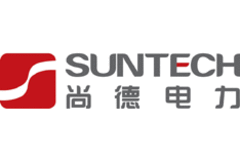
The War Against Oil is the first war in history that everyone can win. (Picture from Treehugger.com.)
But you can’t win if you don’t play. Absent U.S. policies that encourage hydrogen energy, and discourage hydrocarbons, we will continue to fall behind the usual suspects.
Chief among these suspects is China, where Shi Zhengrong runs Suntech Power Holdings Ltd., now a New York Stock Exchange listed company. His own share is estimated to be worth $1.4 billion.

Shi, who was part of China’s "brain drain" of the 1980s and got his
business training in Australia, makes solar voltaic cells, a basic
building block for solar panels. Its product is not cutting-edge, but
given China’s current dominance of the silicon products market, its
lead will be hard to pull back.
Photon International ranks Suntech as the 4th largest photovoltaic
company. None of the other major competitors are American. They include
Sharp and Kyocera of Japan, British Petroleum, and a German start-up
called Q-Cells.
The greatest hope for American gains in this area, believe it or not,
lies with the oil companies. By reordering incentives, by making it
more profitable to invest in solar and other hydrogen technologies,
while making it less profitable to seek new oilfields, the U.S. can
unlock enormous fountains of capital, not to mention engineering and
management expertise.
Of course capital incentives would also stir entrepreneurs, and there
is no guarantee that the big oils could succeed in the new market —
which is why they show no interest in it (except, sometimes,
rhetorically). But there is an awful lot of money, and an awful lot of
human capital, waiting to be unleashed on this problem right now.
While we’re diddling in Iraq. We need to stop fighting the old war for
oil and start fighting the new war against oil if we’re to be a
relevant power in the 21st century. The fate of Argentina is calling.










